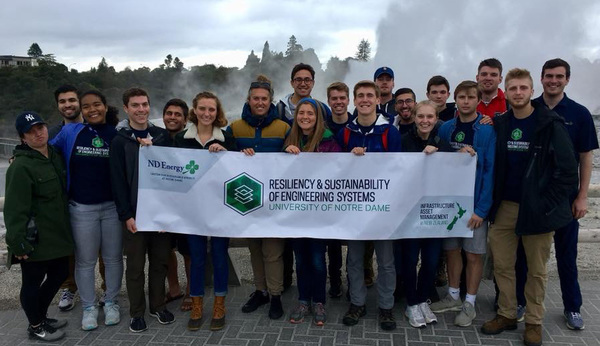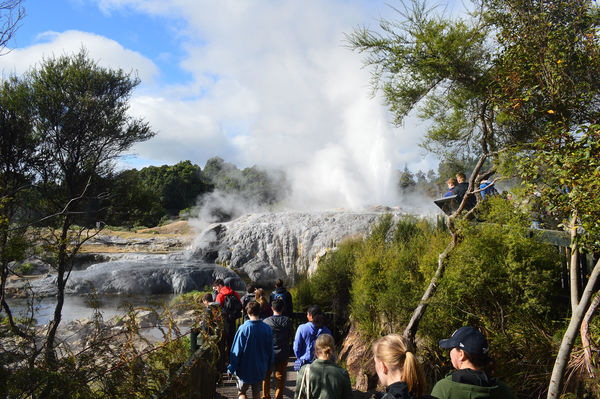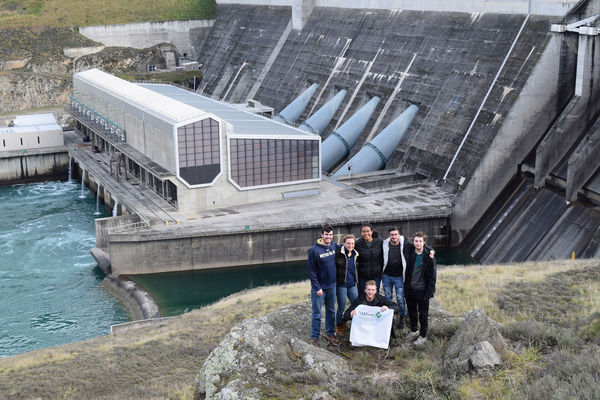New Zealand Experience

In the summer of 2018, a group of students from the Energy Studies Minor (ESM) participated in an inaugural New Zealand experience that fused classroom learning with real world experiences. Spearheaded by Notre Dame professor Kevin Walsh, sixteen undergraduates began their summer down under with a three-week course that prepared them for internships in Auckland, Wellington, and Queenstown. This collaboration between ND Energy’s ESM and the Resiliency and Sustainability of Engineering Systems Minor took advantage of New Zealand’s extreme terrain, multiple rivers and geothermal geysers, along with its location on major fault lines, to teach students about environmental issues that are nonexistent in the Midwest.

Equally unique is that New Zealand generate over 80% of its electricity from renewable energy. While impressive, this statistic mainly stems from necessity. New Zealand makes up a collection of islands in the South Pacific, with a fragile ecosystem and little to no available fossil fuels. Many of the native species are endangered by loss of environment and invasive pests, while its isolation from other countries makes managing key resources like raw materials and clean water a logistical challenge. This delicate balance relies on heavy government oversight, adding another layer of complexity.

Because of this, much of the coursework during the summer internship program centered around asset management best practices with a heavy focus on data. This enabled students to gain real-world experience by exploring how the New Zealand government uses data to manage its energy assets. Internships ranged from helping the Auckland Council Community Facilities track its energy usage to weighing variables involved in choices between energy savings and resiliency to earthquakes.
ESM graduate Rory Burke (’18) participated in the program as a teaching assistant before heading to his new position as systems engineer at Booz Allen Hamilton. The experience reminded him of why he pursued the minor in the first place. “Energy isn’t just an engineering problem, or a business problem, or a political problem – it’s a bit of each. Being immersed in New Zealand served as a pertinent reminder of the natural beauty in this world, but also how easily it could be squandered.” Rory hopes to take the experiences he has had through ESM and apply them during the next steps in his career.
Junior ESM Charles “CJ” Naudet found that his internship with building services gave him a better understanding of the wide variety of energy careers available to him following his education. “This experience has allowed me to have an idea of what it is to deal with managing energy instead of the other side, which is creating it. Building management and services is an industry all in its own.”
Nick Naudet, a junior ESM, “learned a ton about building management systems, HVAC systems, and energy efficiency” while working for the Auckland Council’s Energy and Sustainability team. Nick is eager to continue his learning experience when he returns to campus and into the future. “I will be more excited than ever to continue my energy studies and gain as much experience as possible.”
ESM junior Emily Black worked on several projects, including one with the CJ and Nick Naudet. They surveyed over 240 trees and calculated their carbon sequestration rates. She described her summer as “…fantastic…a giant learning experience in the working world. The nature of New Zealand is a whole other level of beauty I could never have imagined.”
The Maori, one of the cultures highlighted by the Disney film Moana, represent nearly 20% of New Zealand’s population and their culture, customs, and sacred sites remain important considerations for New Zealand’s infrastructure. Senior ESM Marisa Ross worked with the Maori community exploring how their heritage informs their worldview, and the implications of this for science and math education. “I think my internship has helped me be more aware and open minded to different points of view. Doing research has opened my eyes to how important it is to understand, acknowledge, and incorporate cultural/indigenous knowledge.”
ND Energy continues to work on providing unique and relevant opportunities for ESM students to explore the world and learn about energy from a wide variety of angles. Course development grants are available for professors from any department on campus to contribute to current offerings. The Student Energy Board is also engaged in keeping abreast of energy issues and recommending events and speakers for the campus and community. Anyone interested in suggesting new topics for courses or speakers should contact Anne Berges Pillai, apillai@nd.edu.